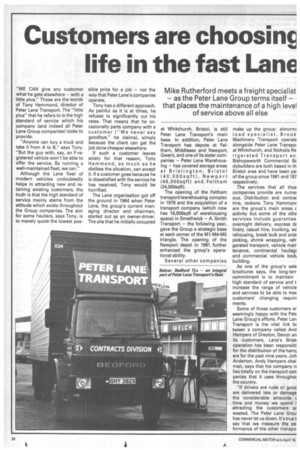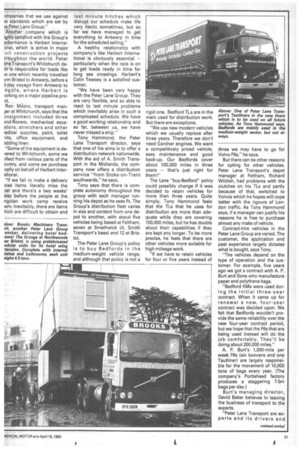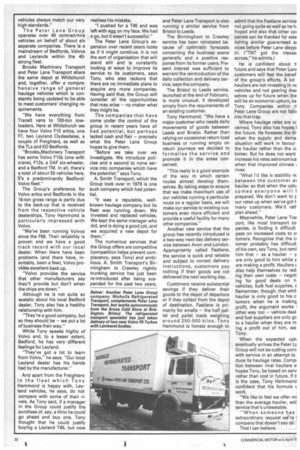Customers are choosinE life in the fast Lane
Page 22

Page 23

Page 24

If you've noticed an error in this article please click here to report it so we can fix it.
"WE CAN give any customer what he gets elsewhere — with a little plus." Those are the words of Tony Hammond, director of Peter Lane Transport. The "little plus" that he refers to is the high standard of service which his company (and indeed all Peter Lane Group companies) looks to provide.
"Anyone can buy a truck and take it from A to B," says Tony. "But the guy with, say, an F-registered vehicle won't be able to offer the service. By running a well-maintained fleet, we can."
Although the Lane fleet of modern vehicles undoubtedly helps in attracting new and retaining existing customers, the truth is that the high standard of service mainly stems from the attitude which exists throughout the Group companies. The aim for some hauliers, says Tony, is to merely quote the lowest pos sible price for a job — not the way that Peter Lane's companies operate.
Tony has a different approach. As painful as it is at times, he refuses to significantly cut his rates. That means that he occasionally parts company with a customer ("We never say goodbye," he claims), simply because the client can get the job done cheaper elsewhere.
If such a customer leaves solely for that reason, Tony Hammond, as much as he dislikes the situation, can accept it. If a customer goes because he is dissatisfied with the service he has received, Tony would be horrified.
The Lane organisation got off the ground in 1964 when Peter Lane, the group's current managing director and chairman, started out as an owner-driver. The site that he initially occupied at Whitchurch, Bristol, is still Peter Lane Transport's main base. In addition, Peter Lane Transport has depots at Felthem, Middlesex and Newport, Gwent, and one of its sister companies — Peter Lane Warehousing — has covered storage areas at Brislington, Bristol ( 4 0,0 0 0 sqft), Newport (4 6,0 0 Osqft) and Feltham (24,000sqft).
The opening of the Feltham transport/warehousing complex in 1978 and the acquisition of a transport company (which now has 16,000sqft of warehousing space) in Smethwick — A. Smith Transport — the following year, gave the Group a strategic base at each corner of the M1-M4-M5 triangle. The opening of the Newport depot in 1981 further enhanced the group's operational ability.
Several other companies make up the group: abnormi load specialist, Brook Machinery Transport operate alongside Peter Lane Transpo at Whitchurch; and Nicholls Re rigerated Transport an Bishopsworth Commercial Bc dybuilders are both based in th Bristol area and have been pa of the group since 1981 and 197 respectively.
The services that all thos companies provide are numel ous. Distribution and contra( hire, reckons Tony Hammon( are the group's main areas c activity but some of the othE services include guarantee overnight delivery, express de livery, casual hire, trunking, wz rehousing, break bulk and ordE picking, shrink wrapping, refr gerated transport, vehicle mair tenance, continental haulagr and commercial vehicle bod) building.
As one of the group's sale brochures says, the long-terr commitment is to maintain high standard of service and t increase the range of vehicle and services to be able to mee customers' changing require ments.
Some of those customers ar seemingly happy with the Pete Lane Group's efforts. Peter Lan Transport is the vital link be tween a company called And Hampers of Dreyton, Devon an its customers. Lane's Bristi operation has been responsibl for the distribution of the hamj ers for the past nine years. Joh Anderton, Andy Hampers chai man, says that his company n lies totally on the transport con panies that it uses throughot the country.
"If drivers are rude or gooc are delivered late or damage the considerable amounts c time and money we spend i attracting the customers ar wasted. The Peter Lane Grou has never let us down. It's true t say 'that we measure the pe formance of the other transpo Dmpanies that we use against le standards which are set by le Peter Lane Group."
Another company which is ighly satisfied with the Group's erformance is Harbert Interneanal, which is active in major ivii construction projects Iroughout the world. Peter ane Transport's Whitchurch deot is responsible for loads like le one which recently travelled om Bristol to Antwerp, before a 3-day voyage from Antwerp to ngola, where Harbert is .orking on a major pipeline proct.
Ron Wore, transport manger at Whitchurch, says that the 3nsignment included three and-Rovers, mechanical excaators, stretchers and other iedical supplies, paint, toilet nits, office equipment, and adding linen.
"Some of the equipment is derered to Whitchurch, some we allect from various parts of the auntry, and some we purchase ,cally on behalf of Harbert Interational.
"If we fail to make a delivery lose items literally miss the pat and there's a two weeks' alay before the people at the ngolan work camp receive iem. Inevitably, there are items 'hich are difficult to obtain and last minute hitches which disrupt our schedule make life very hectic sometimes, but so far we have managed to get everything to Antwerp in time for the scheduled sailing."
A healthy relationship with company's like Harbert International is obviously essential — particularly when the race is on to get loads ready in time for long sea crossings. Harbert's Colin Tewsey is a satisfied eus-' tomer.
"We have been very happy with the Peter Lane Group. They are very flexible, and so able to react to last minute problems which inevitably arise in such a complicated schedule. We have a good working relationship and so far, between us, we have never missed a ship."
Tony Hammond, the Peter Lane Transport director, says that one of his aims is to offer a distribution network nationwide. With the aid of A. Smith Transport in the Midlands, the company now offers a distribution service "from Stoke-on-Trent southwards," he says.
Tony says that there is complete autonomy throughout the group with each manager running his depot as he sees fit. The Group's distribution fleet varies in size and content from one depot to another, with about five vehicles being based at Feltham, seven at Smethwick (A. Smith Transport's base) and 12 at Bristol.
The Peter Lane Group's policy is to buy Bedfords in the medium-weight vehicle range, and although that policy is not a rigid one, Bedford TLs are in the main used for distribution work. But there are exceptions.
"We use new modern vehicles which we usually replace after three years. Therefore we don't need Gardner engines. We want a competitively priced vehicle, easy maintenance and good back-up. Our Bedfords cover about 100,000 miles in three years — that's just right for them!"
The Lane "buy-Bedford" policy could possibly change if it was decided to retain vehicles for more than three years. Quite simply, Tony Hammond feels that the TLs that he uses for distribution are more than adequate while they are covering 100,000 miles, but he has doubts about their capabilities if they are kept any longer. To be more precise, he feels that there are other vehicles more suitable for high mileage work.
"If we have to retain vehicles for four or five years instead of three we may have to go for Volvo F6s," he says.
But there can be other reasons for opting for other vehicles.
Peter Lane Transport's depot manager at Feltham, Richard Wildish, had problems with the clutches on his TLs and partly because of that, switched to Volvos which he hopes will cope better with the rigours of London traffic. As Tony Hammond says, if a manager can justify his reasons he is free to purchase almost any make of vehicle.
Contract-hire vehicles in the Peter Lane Group are varied. The customer, the application and past experience largely dictates what is bought, says Tony.
"The vehicles depend on the type of operation and the cus tomer. For example, five years ago we got a contract with A. P. Burt and Sons who manufacture paper and polythene bags.
"Bedford KMs were used dur
ing the. initial three-year contract. When it came up for renewal a new, four-year contract was decided upon. We felt that Bedfords wouldn't pro vide the same reliability over the new four-year contract period, but we hope that the F6s that are being used instead will do the job comfortably. They'll be doing about 200,000 miles."
A. P. Burt's 1,000-mile per week F6s (six boxvans and one Tautliner) are largely responsi ble for the movement of 10,000 tons of bags every year. (The company's Portishead factory produces a staggering 7.5m bags per day.) Burt's managing director, David Baker believes in leaving the business of transport to the experts.
"Peter Lane Transport are experts and its drivers and
continued overleaf
vehicles always match our very high standards."
The Peter Lane Group operates over 40 contract-hire vehicles on behalf of about six separate companies. There is a mainstream of Bedfords, Volvos and Leylands within the 40stron g fleet.
Brooks Machinery Transport and Peter Lane Transport share the same depot at Whitchurch and, together, offer a comprehensive range of general haulage vehicles which is constantly being updated to be able to meet customers' changing requirements.
"We have everything from Transit vans to 100-ton lowloaders. Here at Whitchurch we have four Volvo F10 artics, one F7, two Leyland Clydesdales, a couple of Freighters, as well as the TLs and KD Bedfords.
"Brooks‘Machinery Transport has some Volvo Fl Os (one with crane), F12s, a DAF six-wheeler, and a Bedford TM. In all, there's a total of about 55 vehicles here. It's a predominantly Bedford/ Volvo fleet."
The Group's preference for Volvo artics and Bedfords in the 16-ton gross range is partly due to the back-up that is received from the respective vehicle dealerships. Tony Hammond is particularly impressed with Volvo. • "We've been running Volvos since the F86. Their reliability is proven and we have a good track record with our local dealer. When there have been problems (and there have, inevitably, been a few), Volvo provides excellent back up.
"Volvo provides the service that other manufacturers say they'll provide but don't when the chips are down."
Although he is not quite so ecstatic about his local Bedford dealer, Tony also has a healthy relationship with him.
"They're a good company, but so they should be — we put a lot of business their way."
While Tony speaks highly of Volvo and, to a lesser extent, Bedford, he has very different feelings for Leyland.
"They've got a lot to learn from Volvo," he says. "Our local Leyland dealer has his hands tied by the manufacturer."
And apart from the Freighters in the fleet which Tony Hammond is happy with, Leyland vehicles, he says, do not compare with some of their rivals. As Tony said, if a manager in the Group could justify the purchase of, say, a Nino he could go ahead and buy one. Tony thought that he could justify buying a Leyland T45, but now realises his mistake.
"I pushed for a T45 and was left with egg on my face. We had a go, but it wasn't successful."
The Peter Lane Group's expansion over recent years looks as if it might continue. It is not the sort of organisation that will stand still and is constantly looking at ways to improve its service to its customers, says Tony, who also reckons that there are no immediate plans to acquire any more companies. Having said that, the Group will consider all the opportunities that may arise — no matter what they might be.
The companies that have come under the control of the group in recent years have all had potential, but perhaps lacked cash and flair — precisely what the Peter Lane Group hopes to give them.
"Before we take over we investigate. We introduce policies and a second to none service into companies which have the potential," says Tony.
A. Smith Transport, which the Group took over in 1979 is one such company which had potential.
"It was a reputable, wellknown haulage company but its fleet was running down. We invested and replaced vehicles. We kept the same manager who did, and is doing a good job, and we acquired a new depot for them."
The numerous services that the Group offers are competitive (competition helps prevent complacency, says Tony) and ambitious. A. Smith Transport's Birmingham to Crawley nightly trunking service has just been re-introduced after being suspended for the past two years,
Below: Another Peter Lane Group company, Nicholls Refrigerated Transport, complements Peter Lane Transport, but works autonomously from the Amos Cold Store at Brie. lington, Bristol. The refrigerated transport specialist has just taken delivery of two new Volvo F6 Turbos with Lamberet bodies.
and Peter Lane Transport is also running a similar service from Bristol to Leeds.
The Birmingham to Crawley service has been reinstated because of optimistic forecasts concerning the business scene generally and a positive response from its former users. Present interest was sufficient to warrant the reintroduction of the daily collection and delivery service, says the company.
The Bristol to Leeds service, launched at the end of February, is more unusual. It developed simply from the requirements of an existing customer.
Tony Hammond: "We have a major customer who needs daily movements of goods between Leeds and Bristol. Rather than relying on occasional return load business or running empty on return journeys we decided to formalise the service and promote it in the areas concerned.
"This really is a good example of the way in which certain routes almost develop themselves. By taking steps to ensure that we make maximum use of our vehicles running a particular route on a regular basis, we will make our service to existing customers even more efficient and provide a useful facility for many other companies."
Another new service that the group has recently introduced is a two-way next-day delivery service between Avon and London. Appropriately called Fastlane, the service is quick and reliable and subject to correct delivery instructions, customers pay nothing if their goods are not delivered the next working day.
Customers receive substantial savings if they deliver their goods to the depot of departure or if they collect from the depot of destination. Fastlane is primarily for smalls — the half pallet and pallet loads weighing around 250-500 kilos. Tony Hammond is honest enough to admit that the Fastlane service not going quite as well as he II hoped and also that other coi panies can be thanked for este lishing similar guaranteed SI vices before Peter Lane steppi in. ("TNT got the messa across," he admits.) He is confident about tl future and says that Peter Lan( customers will feel the benef of the group's efforts. A lot hauliers are not investing in nE vehicles and not gearing thei selves up for future when the will be an economic upturn, sa Tony. Companies within tl Peter Lane Group are not fallii into that trap.
Where haulage rates are cc cerned, Tony also has hopes the future. He foresees the tir when the supply and dema situation will work in favour the haulier rather than the ct tomer. But he does not want increase his rates astronomica when that improved climate rives.
"What I'd like is stability nc between the customer ai haulier so that when the uptu comes everyone will I prepared. We don't want to r our rates up when we've got t many customers. We'd raft plan ahead."
Meanwhile, Peter Lane Trai port, like most transport co panies, is finding it difficult pass on increased costs to ci tamers. Recognise that the ci tomer probably has difficult of his own, say Tony, but remi him that — as a haulier — y are only good to him while y are making a profit. Hauliers t also help themselves by red ing their own costs — negot] ing for good deals on n vehicles, bulk fuel supplies, ( Remember, though, that whil haulier is only good to his c tomers when he is making profit, the argument works I other way too — vehicle deal and fuel suppliers are only gc to a haulier when they are m ing a profit out of him, wa Tony.
When the expected upti eventually arrives the Peter LE Group will not be cutting corn1 with service in an attempt to duce its haulage rates. Comp+ tion between rival hauliers hopes Tony, be based on serv rather than cost in future. If tl is the case, Tony Hammond confident that his formula work.
"We like to feel we offer mi than the average haulier, witl service that's unbeatable.
"When someone has extraordinary request we're 1 company that doesn't say no.'
That I can believe.




















































































